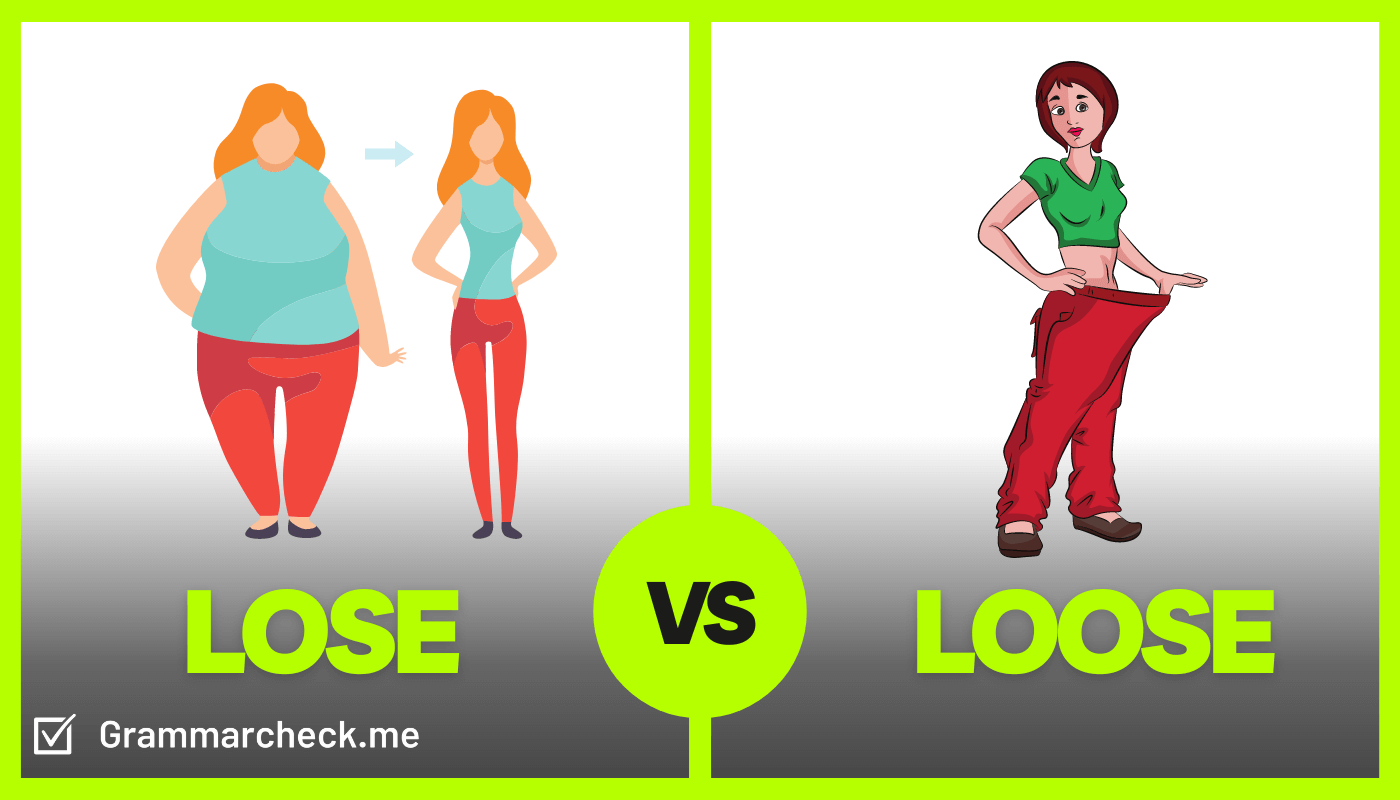Loose or lose weight? Are you making this common mistake? Keep reading to fix it.
The English language is riddled with words that have similar spelling but completely different meanings. Two of those words are “loose” and “lose.”
The issue with confusing these two words is that they may significantly change the meaning of any sentence you use them in if used incorrectly.
This raises the question of which word is correct in which context, such as figuring out whether it’s “loose” or “lose” weight. If you have trouble differentiating these two words and often mix them up in speech and writing, you’ve come to the right place.
In this article, we’ll explain the difference between “loose” and “lose” so that you can properly use both in your writing. These words highlight the importance of grammar and vocabulary in your writing!
Is It Loose or Lose Weight?

Let’s start by jumping right into the answer to this question – is it “loose” or “lose” weight?
The proper spelling of this phrase is “lose weight.” This is based on the definition of the word “lose” and the concept of the phrase that someone is reducing their body weight.
To lose weight means to become thinner or lighter. The context is often humans losing body fat, which is why “lose” is the most appropriate word to use. Just like we saw in the words stoked vs stoaked, small spelling changes can be a big deal.
Let’s dive deeper and explain what “lose” and “loose” each mean.
What Does “Lose” Mean?
“Lose” has several meanings. The first meaning is to misplace something. Take the following sentences as examples:
- I always lose my keys right when I need them.
- Excuse me, sir, did you lose your wallet?
- Don’t lose your phone in the ball pit!
The other meaning of “lose” is to lose at a competition – in other words, to fail to win. Here are some examples of “lose” in this context. Many popular phrases like “Time Flies” are frequently spelled incorrectly!
- My daughter is very competitive and doesn’t like to lose.
- Whoever loses the race has to buy drinks.
- You’re definitely going to lose to Terry!
The last meaning of “lose” is to separate oneself from someone or something, such as in these examples:
- They’re still behind us! We can lose them in the alley.
- Hold my hand, honey. I don’t want to lose you in the mall.
- Make sure you don’t lose Peter; he needs to follow you because he doesn’t know where he’s going.
However, no matter how you use it, “lose” is always a verb.
Now that you know the context of “lose,” you might be wondering: If this is the meaning of “lose,” then what does “loose” mean? Let’s find out.
What Does “Loose” Mean?

“Loose” is an adjective that means that something is the opposite of “tight,” like loose clothes. Just like the words saw or seen, it is often used incorrectly.
There are many different contexts in which you would use the word “loose.” You can use it to refer to something not being physically tight, or it can have a more figurative meaning to describe something not being precise or exact.
Here are some examples of how to use “loose” in a sentence:
- My belt is too loose.
- This dress is a little loose on me.
- Watch out; your shoelace is loose.
The word “loose” is also used in many common expressions, such as:
- “On the loose”: Someone or something is at large or has escaped confinement.
- “Loose as a goose”: To be very calm and relaxed.
- “Loose translation”: An imperfect translation that lacks accuracy and nuance.
- “Loose lips”: To say someone talks a lot or can’t keep a secret.
- “Let loose”: To relax.
However, what’s most important to note is that “loose weight” does not make grammatical sense and should never be used. Just like we learned in the post lens vs lense, spelling can make or break the flow of your writing!
Differences Between Loose and Lose
The main difference between “loose” and “lose” is that one is an adjective, and the other is a verb.
Another difference that’s more apparent in speech is how each of these words is pronounced. While the “o” in both words is pronounced the same – the way that “oo” is usually pronounced, it’s the pronunciation of the ”s” in both words that’s different. Yes, English can be quite confusing!
- The “s” in “loose” is pronounced how “s” is typically pronounced, similar to the words “moose” and “goose.”
In contrast, the “s” in “lose” is pronounced as if there was a “z” in the word instead. Therefore “lose” is pronounced the same way that “booze,” “bruise,” and “ruse” are. As you notice, all of these words have different spellings. It bears repeating that English truly is a complicated language!
Frequently Asked Questions
The correct phrase is lose weight. This means that you reduce your overall body weight. This is most commonly done with a combination of diet and exercise.
It is correct to say lose yourself. This means that you have forgotten who you are as a person and need to make changes to fix the issue.
No, lose and loose have different meanings. Loose is an adjective that means something is not tight. It is most commonly used to describe a person’s clothing.
The Bottom Line
To conclude, the answer to whether it’s “loose” or “lose” weight is that “lose weight” is the proper spelling of the phrase.
It’s understandable why these two words are commonly confused – after all, only a single letter distinguishes them. However, since they have entirely different meanings, it’s essential to understand the differences and when to use each. Once you know the key differences, you’ll be able to use each word accurately in writing and speech. If you are still having trouble with these grammar rules, consider using our reword generator tool to fix your writing for you!
Download Our eBook To Learn How To Create Amazing Content 1x Faster!

